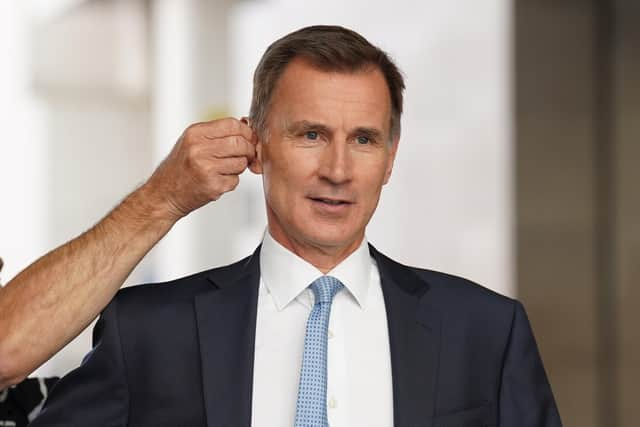Chancellor’s plans to ditch banking protections would increase the risk of further economic instability - Jesse Griffiths
Unless the new government urgently changes course, these reforms should be a flashing red warning sign that Rishi Sunak cannot deliver the stability and prudence he was elected to deliver by the Conservative Party.
The extremely worrying package of measures being pursued by the government increases risks for all of us right across the finance industry.
Advertisement
Hide AdAdvertisement
Hide AdFor instance, the cap (previously set at a generous 200 per cent of annual income) on banker bonuses is being completely lifted, measures to hold senior bankers responsible if their actions lead to a crash may be removed, and the capital that insurers hold to prevent crisis is being reduced to levels the Bank of England deems unsafe.


Perhaps most unpopular is that the government is also looking to relax the 'ring fence' – rules introduced after the great crash that separate big banks’ high street retail operations from investment banking arms.
Their aim is to protect ordinary people’s money and savings, held in our everyday bank accounts, from riskier investment banking operations.
The ring fencing regime was a sensible step to stop problems in risky parts of the financial system affecting the essential banking services we all depend on. An independent review undertaken this year concluded that ring fencing has helped make retail banking safer, had limited impacts on competition, and should be retained.
Advertisement
Hide AdAdvertisement
Hide AdIn the run up to the review, the head of the Prudential Regulation Authority emphasised the centrality of ring-fencing to banking stability, saying he would defend the rules to 'his last drop of blood.'
Last week, the chair of the Independent Commission on Banking that conceived of the ring fence, senior economist Sir John Vickers, warned that the ringfence is the bedrock of banking regulation in the UK.
In fact, ring fencing was already a weaker version of what many argued was really needed following the crash – the statutory separation of retail and investment banking.
Why then is the government now contemplating relaxing the rules? Could it be part of a desperate attempt to characterise new policies as ‘Brexit freedoms’? Changes to the ring fence could have been undertaken within the EU. Parts of the industry clearly would like to see the rules removed, arguing that they impose unnecessary costs on them. But none of these reasons remotely compare with the importance of maintaining financial stability and protecting consumers, particularly as we face difficult and volatile economic conditions.
Advertisement
Hide AdAdvertisement
Hide AdThe financial system is more fragile now than at any time since the global financial crisis. A lengthy period of low interest rates has fuelled asset prices and encouraged a major debt build-up: global debt is higher than it has ever been. A meltdown in the pensions industry was only averted through massive Bank of England intervention in October.
The rise of currency hedging that triggered this is, some argue, posing wider financial stability risks. The collapse of FTX has burst the crypto-bubble, and bubbles in other parts of the system could be next.
The IMF has pointed to investment funds with illiquid assets as a danger zone, while others have warned of an overload of debt in consumer markets, such as car leasing. This is without factoring in the impact a fall in house prices caused by rising interest rates and recession could have.
Let us not forget that it was problems in the housing market that triggered the last global crisis, and that this was preceded by a period of financial deregulation.
Advertisement
Hide AdAdvertisement
Hide AdAs recession, inflation and climate change also greatly increase the risk of financial crises, clearly now is a time to be cautious – to test and improve the rules that act as props to stop the financial roof caving in.
As a reminder, the crash saw millions lose their savings, homes, businesses and jobs, and cost the UK an estimated £1.8 trillion in lost UK GDP. Instead, the government is pushing ahead with weakening safeguards. It is also undermining the independent regulators that we depend on to keep the system safe.
Though the government had to abandon its plans to introduce a ‘call- in’ power to allow it to overrule the regulators, it plans to give the regulators a legal obligation to promote the industry via the Financial Services and Markets Bill - a bill that will impact millions of people up and down the country, and is currently working through parliament. This risks making the regulators cheerleaders for the very industry they are supposed to police, and will reduce their power to act in the public interest in future.
The Chancellor promised a ‘Big Bang 2.0’ of finance industry reform. We must now pray that this bang will not bring the whole system crashing down with it.
Jesse Griffiths is CEO of Finance Innovation Lab.